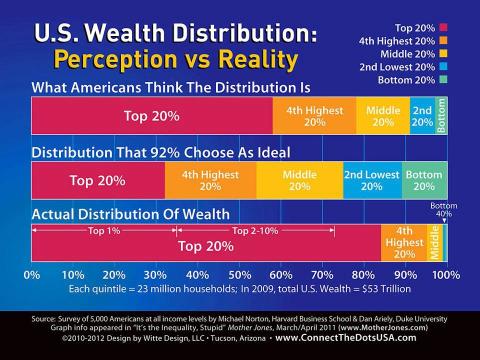"As riches increase and accumulate in few hands. . . the tendency of things will be to depart from the republican standard."-Alexander Hamilton
Knowing full well that I will earn the eternal contempt of anyone who has ever finished an Ayn Rand novel, I am going to go ahead and say it anyway: the current level of wealth and income inequality in the United States is not a good thing.
Inequality in America is worse now than it has been since the late 19th century, when factory workers were paid in company script and the most important industry in the Southern states was sharecropping. The distribution of wealth in the United States (as measured by the Gini coefficient) is about as unequal as it is in Iran and far less equal than it is in nearly every other country in the Industrialized West. In the long term, this will have serious consequences for America. High levels of income inequality are incompatible with political stability, public investment, and long-term expansion.
Let me be clear that I am not against capitalism. I am decidedly for it. I believe that free markets do better than any other mechanism at creating and distributing goods and services. Command economies work against human nature, which operates primarily from self-interest, fear, and an insatiable desire to own and consume stuff. Market-based economies provide the best incentives for both the production and the consumption of stuff. I get that, and I don’t have any delusions that socialism does, or could, work better.
But like most good things (oxygen, say, or chocolate), capitalism works best when it has been diluted from its purest essence. Supporters of capitalism like to point out that communism and socialism have been tried and have failed. True enough. I would not have wanted to live in the Soviet Union circa 1975.
But the same goes for England or America circa 1875. Pure, unregulated capitalism has been tried too, and it didn’t work either. It lead—as it must always lead—to monopolies, oligarchies, price fixing, environmental degradation, massive abuses of labor, great wealth for a very few, and virtual slavery for most workers. Though this society generated great wealth, it also produced horrendous poverty and a perpetual underclass; it was not a society that I would have wanted to live in. I simply don’t have the constitution to work sixteen-hour shifts in the coal mines in exchange for a baked potato.
Most of the people who lived in that society didn’t want to live in it either, so they changed it. Some pundits today love to rail against the Progressive movement of the early 20th century, which produced their least favorite Constitutional Amendments (16 and 17). But this period was a textbook example of how democracy is supposed to work. The vast majority of the people in America did not like what their society had become, so they changed it. They made it fairer, more compassionate, and, at the same time, stronger and more productive than it had ever been before.
One of the most pernicious myths of our current political discourse is that any economic system short of absolute capitalism is contrary to all of the values for which America stands. This, it turns out, is a bunch of nonsense. Those values allow and require us to use the political process to create the kind of society that we want to live in. I do not claim to know where the proper balance lies—the equilibrium point where the tremendous productive potential of capitalism can be harnessed and its worst effects controlled—but I know that we have a right to try to find it. That's why they call it "self-government."
